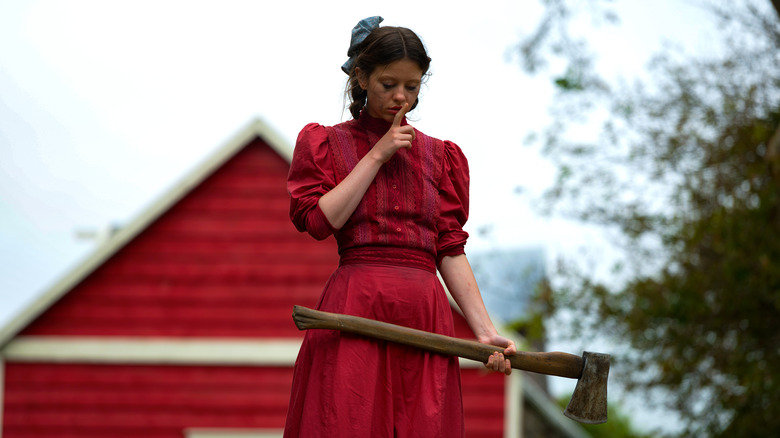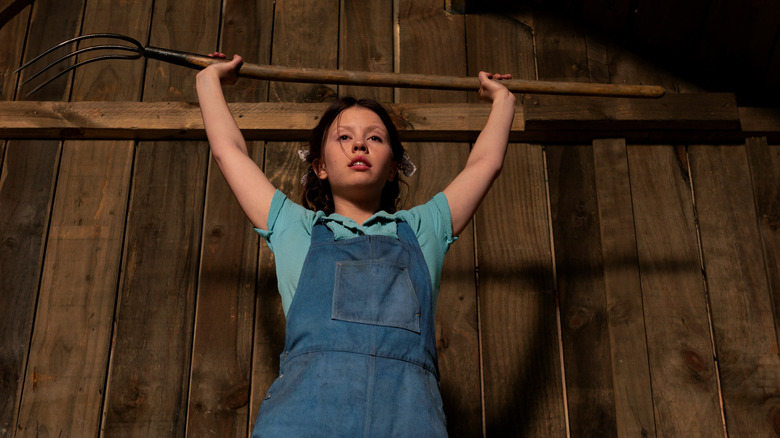Pearl Review: Mia Goth Goes Bonkers For Fame And Love In Her Biggest Breakout Role Yet [Venice]
There is no human impulse stronger than the need to be loved. It's not something we can control, and that is simultaneously haunting and beautiful. When you're without it, it can become an addiction, a constant struggle to find the feeling of joy in having that kind of mutual support — which is the driving force on Ti West's latest horror entry, "Pearl." It can affect everything you do and even make a killer out of you. What's more, the new film — West's second in over six years — uses the golden age of cinema as a framework through which to visually tell this fascinating and gripping slasher story, two styles that seemingly wouldn't mix. "Pearl" is an ambitious and bold work of horror that calls into question what it means to deserve love and the bad things we sometimes do to receive it.
"Pearl" continues the story of the villain of West's recent slasher, "X," except this time, we're transported back to Mia Goth's character's youth on a gorgeous farm in 1918. Stuck caring for her ailing father under the watchful eye of her devout and cruel mother, she dreams of a life of stardom that she feels is far beyond her reach but well within her vast potential. After meeting a handsome projectionist (David Corenswet) in town and attending a local dance troupe audition at a church, the slightly strange and secretly unhinged Pearl finds the courage — and the rage — to make the changes she wants to see in her life, consequences be damned.
Bringing Technicolor back
If you're looking for a similar style to "X," this movie will probably shock you with its technicolor look and an almost Disney feel in production design and color-grading, which helps transport us to a different time in a familiar place. The home we know from "X" is shiny and new, signifying that this is an altogether different film than the one where we were introduced to this world and story, and falls right in line with the early century time period.
The cleaned-up, dreamlike look of the movie makes a significant impression, not only for its juxtaposition to "X" but also because in and of itself, such a magical, beautiful setting and style is just not common in horror movies. Using that type of polish as a jumping point for the film's horror is a brilliant and unique move that has potentially never been seen in the genre before. It plays like "Mary Poppins" if it were a gleefully demented yet utterly gorgeous horror movie, with one hell of a lead performance to tie it all together.
Physical and emotional crafting of a character
There's no denying that this is Mia Goth's best performance to date — which is interesting considering she commits deeply to her two roles in "X," particularly the challenge of playing an elderly woman with expired dreams, long-lasting regrets, and palpable resentment. Goth's turn as old Pearl in "X" was a successful exercise in the physical and emotional crafting of a character, but with "Pearl," we see a different and heightened side of the titular villain. She's desperate and full of desires and dreams, and she can't find a way to suppress the urge to make those dreams and desires a reality at any cost.
Goth plays into that with her juxtaposition of innocence and anger. The audience slowly starts to realize the character has excellent command over both sides of that emotional coin, and that it will end up being her greatest downfall due to her inability to come to grips with the various realities of her life she is unable to face. Even when we think she can reconcile with the hand she's been dealt — Goth gives an incredible monologue during the film that asserts as such — Pearl can't help but revert back to the only catharsis she truly knows. Goth is utterly transcendent in this role, and its impact feels akin to one of the great horror breakouts, like Jamie Lee Curtis as Laurie Strode in "Halloween." Like Pearl herself, Goth is an absolute star in the making.
The only thing Pearl truly wants
Tandi Wright — the fierce actress who played Ruth, Pearl's spiteful mother — is also commendable for her performance in the slasher, especially because she came into the role after working as the intimacy coordinator on "X" amid a two-film shoot in New Zealand during the initial COVID pandemic period. Her work here is a major part of what endears the audience to Pearl and her hopes and dreams despite her cruel and brutal way of making those things her reality, because she is so utterly vicious to her daughter with cutting words, deadly stares, and constant orders of housework and care demands.
Because of Wright's understanding of how terrible Ruth should be, Pearl's fall from grace packs a serious punch and the implications of how the matriarch's treatment has warped the lead character's sense of security and support. After all, love is the only thing Pearl truly wants, and the fact that she can't even get it from her mother in a way that feels genuine is imperative to the essence of her character. None of that could happen quite the way it does without Wright's unflinching and intense austerity.
Yearning for another life
Compounding on both Goth's performance and her character's innate desperation to truly be adored and understood, the end credits lay bare the main theme of the film in such a simple yet eerie and uncomfortable way — and they honestly might be my favorite part of the movie. In an effort to keep the spoilers at bay, I'll simply say this: When met with the prospect of the thing she craves most, love, Pearl starts to crack at the seams, displaying adoration and terror in equal measure in one of the most uncomfortable yet simple ways possible. West's decision to end on this note hammers home the idea that love can make people do terrible things, but deep down they're not necessarily always bad people. You root for Pearl throughout the film in spite of her flaws, and it's painful to see her struggling particularly in the silent credits scene. However, it lays the groundwork for "X," which comes next chronologically in the timeline of West's new horror world, quite nicely, even if those final moments are totally unorthodox and basically psychotic (in a good way).
During the Venice Film Festival press conference for "Pearl," West described the film's story as a typical narrative in which a person yearns for "another life," yet that new life is atypical from the one we'd expect her to evolve into. It's a very "Disney princess" type of story, which is why its demented approach and maniacal imagery hits so hard. It's strange and devastating, but again, so is being deprived of the love we need as human beings to survive and thrive in this world. As we already know, Pearl doesn't exactly get the new life she wanted; We know that because of "X," but it was so fun as a viewer to discover where that murderous impulse was born and why it has stayed within her for over 50 years. After all, everyone has to start somewhere.
/Film Rating: 8.5 out of 10




